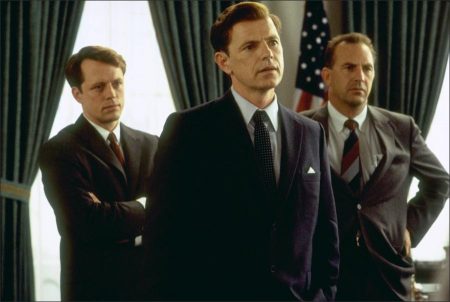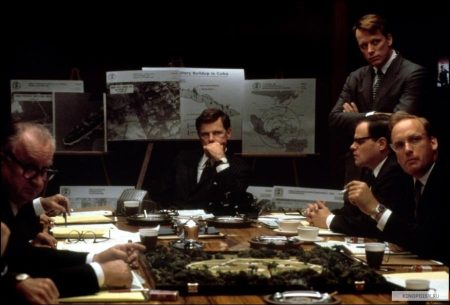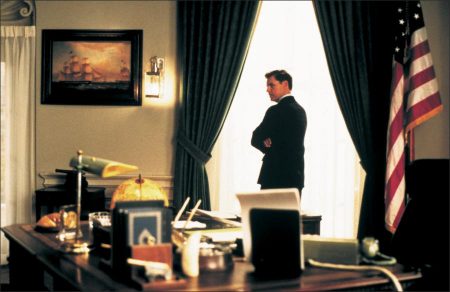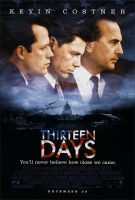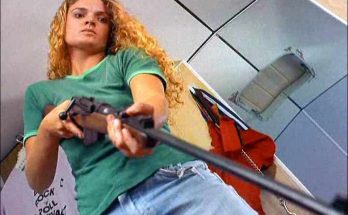Taglines: You’ll never believe how close we came.
Thirteen Days movie storyline. In October, 1962, U-2 surveillance photos reveal that the Soviet Union is in the process of placing nuclear weapons in Cuba. These weapons have the capability of wiping out most of the Eastern and Southern United States in minutes if they become operational. President John F. Kennedy and his advisors must come up with a plan of action against the Soviets.
Kennedy is determined to show that he is strong enough to stand up to the threat, and the Pentagon advises U.S. military strikes against Cuba–which could lead the way to another U.S. invasion of the island. However, Kennedy is reluctant to follow through, because a U.S. invasion could cause the Soviets to retaliate in Europe. A nuclear showdown appears to be almost inevitable. Can it be prevented?
Thirteen Days is a 2000 American historical political thriller film directed by Roger Donaldson, dramatizing the Cuban Missile Crisis of 1962, seen from the perspective of the US political leadership. Kevin Costner stars as political consultant Kenneth P. O’Donnell, with Bruce Greenwood featured as President John F. Kennedy, Steven Culp as Attorney General Robert F. Kennedy, and Dylan Baker as Secretary of Defense Robert McNamara.
The film was given a limited theatrical release on Christmas Day 2000, and a wide release on January 12, 2001, with a staggered release to various countries throughout most of the year. The film grossed $66,579,890 worldwide against an $80 million budget.
About the Story
In October 1962, U-2 aerial surveillance photos reveal that the Soviet Union is in the process of placing intermediate-range ballistic missiles carrying nuclear weapons in Cuba. President John F. Kennedy (Bruce Greenwood) and his advisers must come up with a plan of action to prevent their activation. Kennedy is determined to show that the United States will not allow a missile threat.
The Joint Chiefs of Staff advise immediate U.S. military strikes against the missile sites followed by an invasion of Cuba. However, Kennedy is reluctant to attack and invade because it would very likely cause the Soviets to invade Berlin, which could lead to an all-out war. Citing The Guns of August, Kennedy sees an analogy to the events that started World War I, where the tactics of both sides’ commanders had not evolved since the previous war and were obsolete, only this time nuclear weapons are involved. War appears to be almost inevitable.
The Kennedy administration tries to find a solution that will remove the missiles but avoid an act of war. They settle on a step less than a blockade, which is formally regarded as an act of war. They settle on what they publicly describe as a quarantine. They announce that the U.S. naval forces will stop all ships entering Cuban waters and inspect them to verify they are not carrying weapons destined for Cuba.
The Soviet Union sends mixed messages in response. Off the shores of Cuba, the Soviet ships turn back from the quarantine lines. Secretary of State Dean Rusk (Henry Strozier) says, “We’re eyeball to eyeball and I think the other fellow just blinked.” The administration continues to order spy plane pictures, but one of Kennedy’s advisers, Kenny O’Donnell (Kevin Costner), calls the pilots to ensure the pilots do not report that they were shot at or fired upon, because if they were, the country would be forced to retaliate under the rules of engagement.
John A. Scali, a reporter with ABC News, is contacted by Soviet “emissary” Aleksandr Fomin (Boris Lee Krutonog), and through this back-channel communication method the Soviets offer to remove the missiles in exchange for public assurances from the U.S. that it will never invade Cuba. A long message in the same tone as the informal communication from Fomin, apparently written personally by Soviet Premier Nikita Khrushchev, is received.
This is followed by a second, more hard line cable in which the Soviets offer a deal involving U.S removal of its Jupiter missiles from Turkey. The Kennedy administration interprets the second as a response from the Politburo, and in a risky act, decides to ignore it and respond to the first message, assumed to be from Khrushchev.
There are several mis-steps during the crisis: the defense readiness level of Strategic Air Command (SAC) is raised to DEFCON 2 (one step shy of maximum readiness for imminent war), without informing the President; a nuclear weapon test proceeds (Bluegill Triple Prime) and a routine test launch of a U.S. offensive missile is also carried out without the President’s knowledge.
Thirteen Days (2001)
Directed by: Roger Donaldson
Starring: Kevin Costner, Bruce Greenwood, Shawn Driscoll, Lucinda Jenney, Caitlin Wachs, Jon Foster, Matthew Dunn, Stephanie Romanov, Frank Wood, Dakin Matthews
Screenplay by: David Self
Production Design by: J. Dennis Washington
Cinematography by: Roger Deakins
Film Editing by: Conrad Buff
Costume Design by: Isis Mussenden
Set Decoration by: Denise Pizzini
Art Direction by: Ann Harris, Thomas T. Taylor
Music by: Trevor Jones
MPAA Rating: PG-13 for brief strong language.
Distributed by: New Line Cinema
Release Date: January 12, 2001
Views: 149
